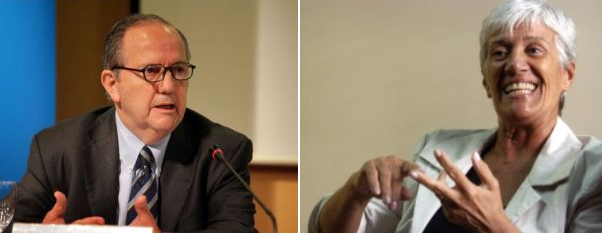Two UN Special Rapporteurs to Visit Sri Lanka in April

( Juan Méndez & Mónica Pinto)
Two UN Special Rapporteurs are to visit Sri Lanka in April after the new Government agreed on the proposed dates.
The Special Rapporteur on the independence of judges and lawyers Mónica Pinto and the Special Rapporteur on torture and other cruel, inhuman or degrading treatment or punishment Juan Méndez will visit Sri Lanka from 29 April 2016 to 7 May 2016.
The Special Rapporteur on the independence of judges and lawyers acts on information submitted to her attention concerning alleged violations relating to the independence and impartiality of the judiciary and the independence of the legal profession by sending allegation letters and urgent appeals to concerned Governments to clarify and/or bring these cases to their attention.
The mandate of the Special Rapporteur on torture and other cruel, inhuman or degrading treatment or punishment covers all countries, irrespective of whether a State has ratified the Convention against Torture and Other Cruel, Inhuman or Degrading Treatment or Punishment. (Colombo Gazette)
Country and visits of Special Procedures
Mandate-holders carry out country visits to assess the situation of human rights at the national level : at the request of a mandate-holder, the Government will send an invitation for a fact-finding mission. Some countries have issued standing invitations, which means that they are, in principle, prepared to receive a visit from any thematic mandate-holder.
During such missions, the experts assess the general human rights situation in a given country, as well as the specific institutional, legal, judicial, administrative and de facto situation under their respective mandates. They will meet with national and local authorities, including members of the judiciary and parliamentarians; members of the national human rights institution, if applicable; non-governmental organizations, civil society organizations and victims of human rights violations; the UN and other inter-governmental agencies; and the press when giving a press-conference at the end of the mission.
Country visits’ findings, conclusions and recommendations by special procedures are published in mission reports to the Human Rights Council (All special procedures country-related information can also be found in the Universal Human Rights Index.
Terms of Reference for Fact-finding missions by Special Procedures
Terms of Reference for Fact-finding missions by Special Procedures
The terms of reference for country visits were adopted at the fourth Annual Meeting of Special Procedures ( E/CN.4/1998/45) and are intended to guide Governments in the conduct of the visit. During missions, Special Procedures mandate-holders and United Nations staff accompanying them, should be given the following guarantees and facilities by the Government that invited them to visit its country:
(a) Freedom of movement in the whole country, including facilitation of transport, in particular to restricted areas;
(b) Freedom of inquiry, in particular as regards:
(b) Freedom of inquiry, in particular as regards:
(i) Access to all prisons, detention centres and places of interrogation;
(ii) Contacts with central and local authorities of all branches of government;
(iii) Contacts with representatives of non-governmental organizations, other private institutions and the media;
(iv) Confidential and unsupervised contact with witnesses and other private persons, including persons deprived of their liberty, considered necessary to fulfil the mandate of the special rapporteur; and
(v) Full access to all documentary material relevant to the mandate;
(ii) Contacts with central and local authorities of all branches of government;
(iii) Contacts with representatives of non-governmental organizations, other private institutions and the media;
(iv) Confidential and unsupervised contact with witnesses and other private persons, including persons deprived of their liberty, considered necessary to fulfil the mandate of the special rapporteur; and
(v) Full access to all documentary material relevant to the mandate;
(c) Assurance by the Government that persons, whether officials or private individuals, who have been in contact with the special rapporteur/representative in relation to the mandate, will not, as a result, suffer threats, harassment or punishment or be subjected to judicial proceedings;
(d) Appropriate security arrangements without, however, restricting the freedom of movement and inquiry referred to above.
(d) Appropriate security arrangements without, however, restricting the freedom of movement and inquiry referred to above.
